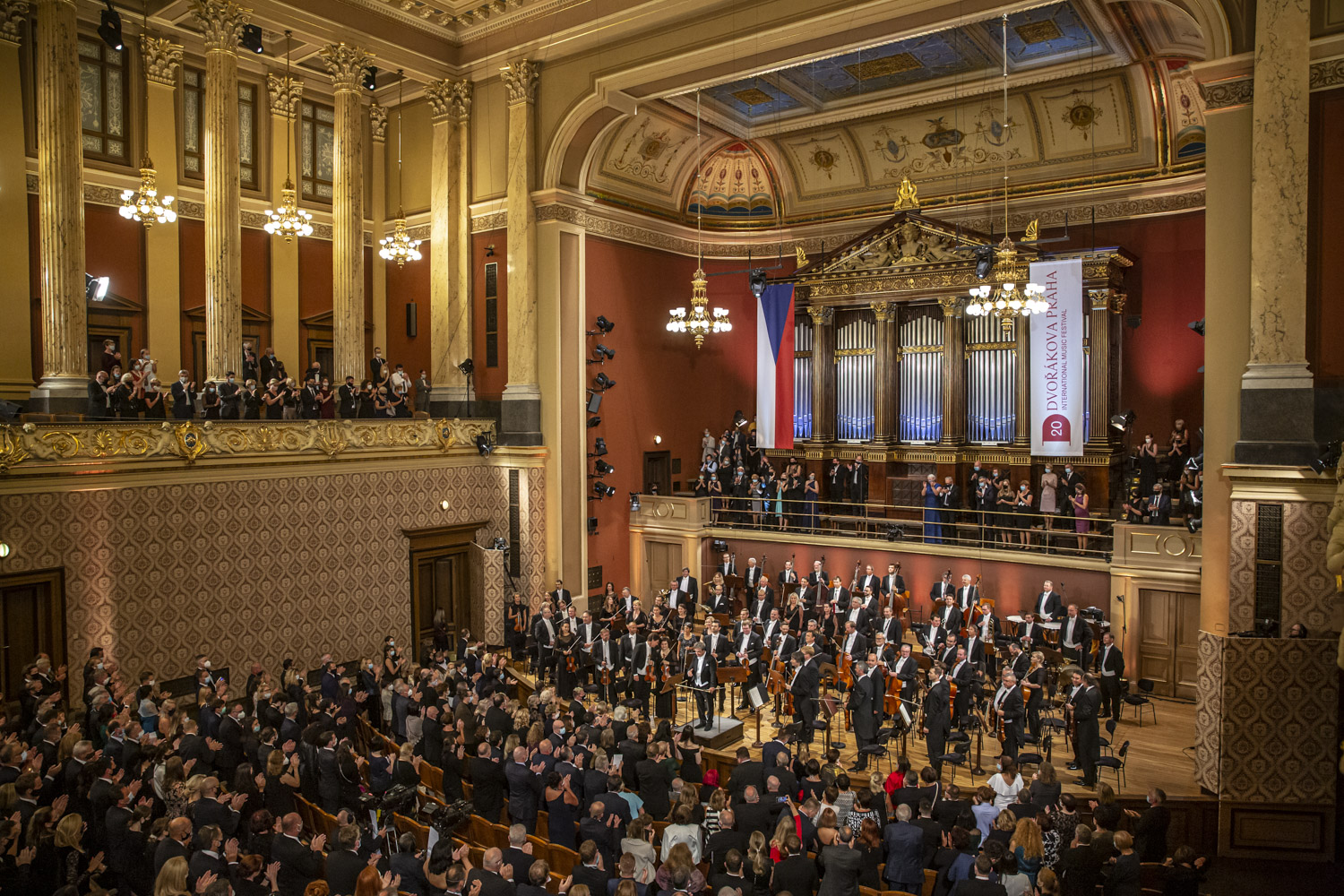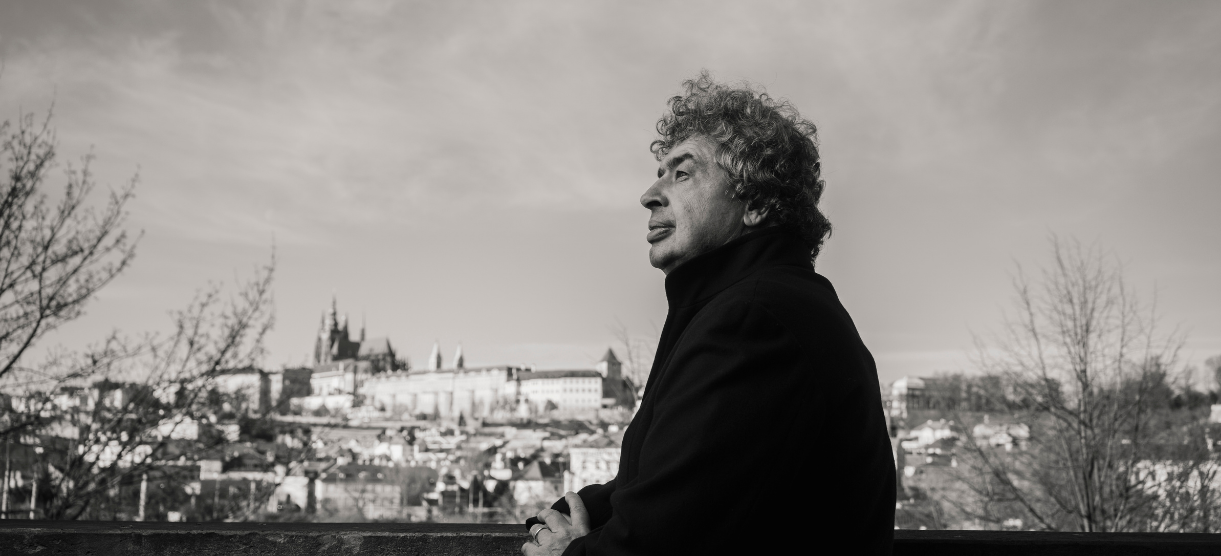
Antonín Dvořák: Rusalka, op. 114, B. 203
Měsíc zalévá celý svět jasným světlem a lovec marně pronásleduje svoji bílou laň. Pohádková atmosféra Rusalky je tak omamná, až dává zapomenout na hloubku pochopení pro velikost i ubohost, které jsou vlastní jak lidem, tak nadpřirozeným bytostem. Dvořákova a Kvapilova Rusalka je lyrický příběh o touze po lidské duši, která je plná hříchu, ale také lásky. O pomíjivosti velkých citů a nemožnosti se dorozumět. Ale také o tom, že svá rozhodnutí nelze vzít zpět. Rusalka není jen pohádka o nešťastné lásce, ale psychologické a symbolické drama, které se právem zařadilo mezi nejhranější české opery současnosti.
Dirigent Jiří Bělohlávek o Rusalce prohlásil, že se dotýká všech aspektů lidské přirozenosti – lásky, touhy, vášně, zrady, pomsty, smrti, odpuštění i oběti v tak úchvatném a samozřejmém oblouku, že se až tají dech.
Dvořákova Praha spojí své síly s Českou filharmonií a jejím šéfdirigentem Semyonem Bychkovem, aby společně navázali koncertním provedením Dvořákova operního klenotu na předchozí počiny festivalové řady Opera in Concert. Po uvedení Dvořákových méně známých oper zazní tentokrát ta, která jej jako autora oper celosvětově proslavila. Semyon Bychkov společně s dramaturgií festivalu přizval mezinárodní sestavu sólistů, jakou lze slýchat v těch nejproslulejších operních a koncertních domech světa. Všechny aspekty Dvořákovy nejlepší opery se tak rozzáří ničím nerušenou silou autorovy hudby.
Gramophone’s 2024 ‘Orchestra of the Year’, the Czech Philharmonic gave its first concert – an all-Dvořák programme conducted by the composer himself – in the famed Rudolfinum Hall on 4 January 1896. The Orchestra is acknowledged for its definitive interpretations of Czech composers and recognised for its special relationship with the music of Brahms, Tchaikovsky, and Mahler, who conducted the world première of his Symphony No. 7 with the Orchestra in 1908. It is currently recording the complete cycle of Mahler symphonies with Chief Conductor and Music Director Semyon Bychkov for Pentatone.
The Czech Philharmonic’s extraordinary and proud history reflects both its location at the very heart of Europe and the Czech Republic’s turbulent political history, for which Smetana’s Má vlast has become a potent symbol. 2024 was the Year of Czech Music, a major celebration launched on the bicentenary of Smetana’s birth and held across the Czech Republic every ten years. The Czech Philharmonic marked Smetana’s bicentenary with a series of concerts at the Smetana Litomyšl Festival, including a rare concert performance of his opera Libuše, conducted by Principal Guest Conductor Jakub Hrůša.
The contribution of the Czech Philharmonic and Semyon Bychkov to the Year of Czech Music was the Dvořák Festival, a combined performance of three overtures, instrumental concerts, and the last three symphonies of Antonín Dvořák, both in Prague and on tour in South Korea, Japan, Spain, Austria, Germany, Belgium, and France. The highlight of the Year of Czech Music performed by Semyon Bychkov and the Czech Philharmonic was a series of three concerts in New York's Carnegie Hall.
Alongside the Czech Philharmonic’s Youth Orchestra, Orchestral Academy, and Jiří Bělohlávek Prize for young musicians, a comprehensive education strategy engages with more than 400 schools, bringing students of all ages to the Rudolfinum – some travelling as long as four hours – to hear concerts and participate in workshops. An inspirational music and song programme led by singer Ida Kelarová for the extensive Romani communities within the Czech Republic and Slovakia has helped many socially excluded families to find a voice.
An early champion of the music of Martinů and Janáček, the works of Czech composers – both established and new – remain the lifeblood of the Orchestra. Instigated by Semyon Bychkov at the start of his tenure, nine Czech composers and five international composers – Detlev Glanert, Julian Anderson, Thomas Larcher, Bryce Dessner, and Thierry Escaich – were commissioned to write for the Orchestra.
source: Česká filharmonie
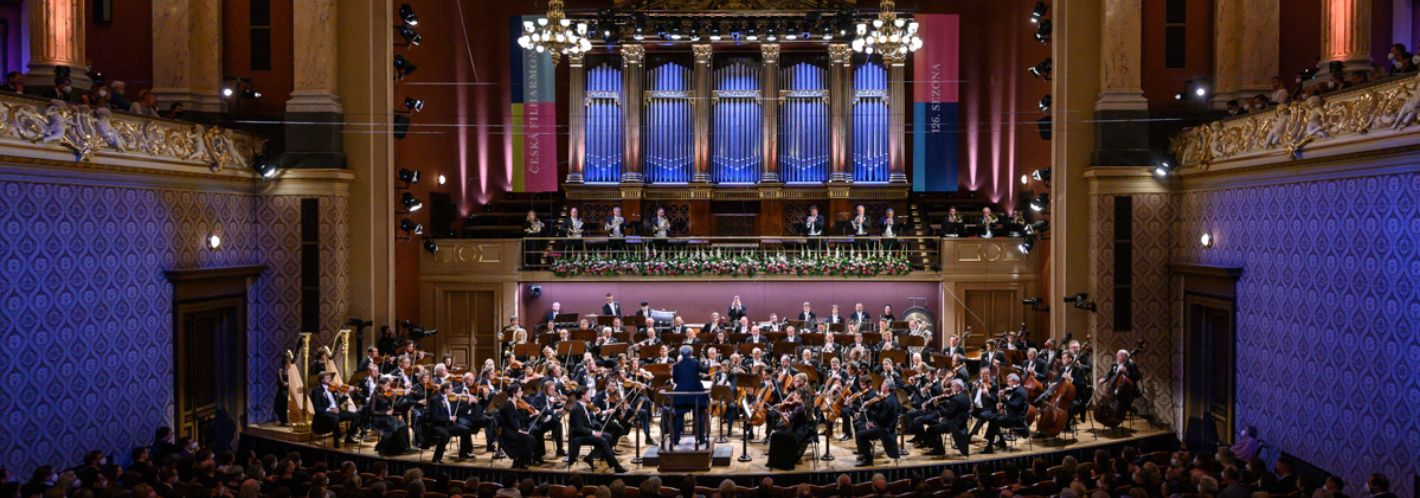
Semyon Bychkov is one of today’s most sought-after conductors because of his clear opinions on interpretation and his emphasis on beauty of sound. He was born in 1952 in what was then called Leningrad, and he graduated from the conservatoire there. After emigrating from the Soviet Union to the United States in the 1970s, he soon earned an outstanding international reputation. He has been a long-term collaborator with the world’s best orchestras, including the philharmonic orchestras in Vienna, Berlin, and Munich, the Leipzig Gewandhaus Orchestra, the London Symphony Orchestra, and the New York Philharmonic. He also devotes himself intensively to opera, conducting at the Metropolitan Opera in New York, the Vienna State Opera, the Teatro Real Madrid, La Scala in Milan, and the Opéra national de Paris, where he has conducted productions of operas ranging from Mozart’s Don Giovanni to Strauss’s Elektra. He also has a vast discography, including highly acclaimed recordings of Verdi’s Requiem and Wagner’s Lohengrin and the complete symphonies of Brahms. Since the 2018/19 season, he has been the chief conductor of the Czech Philharmonic.
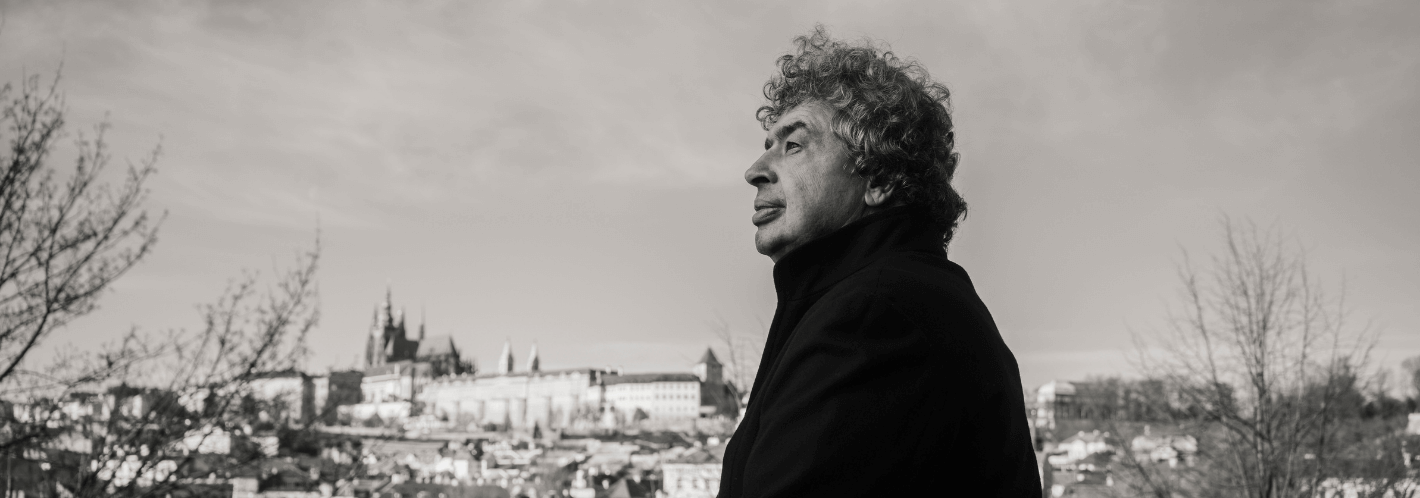
The Prague Philharmonic Choir (PPC) was founded in 1935 by choirmaster and teacher Jan Kühn. Now in its 91st season, it is the oldest professional choir in the Czech Republic. The choir is celebrated beyond Czech borders, especially for its interpretations of oratorios and cantatas. Lukáš Vasilek has served as Principal Conductor and Artistic Director since 2007, joined by Lukáš Kozubík as the choir’s Second Choirmaster.
Under Lukáš Vasilek’s leadership, the Prague Philharmonic Choir has established a reputation as a highly esteemed performing partner of leading international orchestras. At home, the ensemble collaborates regularly with the Czech Philharmonic and, for its own choral concerts, with the Prague Philharmonia. Internationally, the PPC has worked with ensembles such as the Berlin and Dresden Philharmonic Orchestras, Wiener Symphoniker, NDR Elbphilharmonie Orchestra, and the Hong Kong Philharmonic Orchestra.
The PPC has also gained extensive experience working with the world’s top conductors, including Semyon Bychkov, Jakub Hrůša, and Sir Simon Rattle. The choir regularly appears at the Czech Republic’s most renowned festivals, such as Smetana’s Litomyšl, Prague Spring, Dvořák Prague, and Days of Bohuslav Martinů. Since 2010, the PPC has served as Choir in Residence at the Bregenzer Festspiele.
In its 91st season, the Prague Philharmonic Choir will embark on further exciting collaborations with world-renowned conductors, including Zubin Mehta, Antonio Pappano, and Giovanni Antonini.
Alongside its performances, the PPC engages in numerous educational projects. Every season, it presents a cycle of educational concerts for children, catering to both school groups and families. These programs emphasize fun and active engagement with young listeners. The PPC Choral Academy in Honour of Soňa Červená offers singing students the opportunity to gain hands-on experience in a professional ensemble, participate in large-scale musical projects, and learn from collaborations with leading artists.
The choir’s artistic excellence is further demonstrated through its rich recording archive, which continues to expand each season. The PPC has appeared on releases from PENTATONE, Decca Classics, Sony Classical, and Supraphon. Its recordings have earned numerous international accolades, including awards from Gramophone, BBC Music Magazine, and the prestigious Diapason d’Or de l’Année. The PPC’s very first recording, made in 1952, featured Dvořák’s oratorio Stabat Mater conducted by Václav Talich. Its most recent release, Stravinsky, Janáček, Bartók: Village Stories, explores the magic of folk songs and traditional rituals in the music of three 20th-century masters.
The Prague Philharmonic Choir is a laureate of the 2018 Classic Prague Award for Best Vocal Concert, Czech Television’s Classical Music of the Year Award, and the 2022 Antonín Dvořák Prize for exceptional artistic achievements and the promotion of Czech music. The album Village Stories received the Choc de Classica award in May 2024.
source: Prague Philharmonic Choir
photo © Petr Chodura
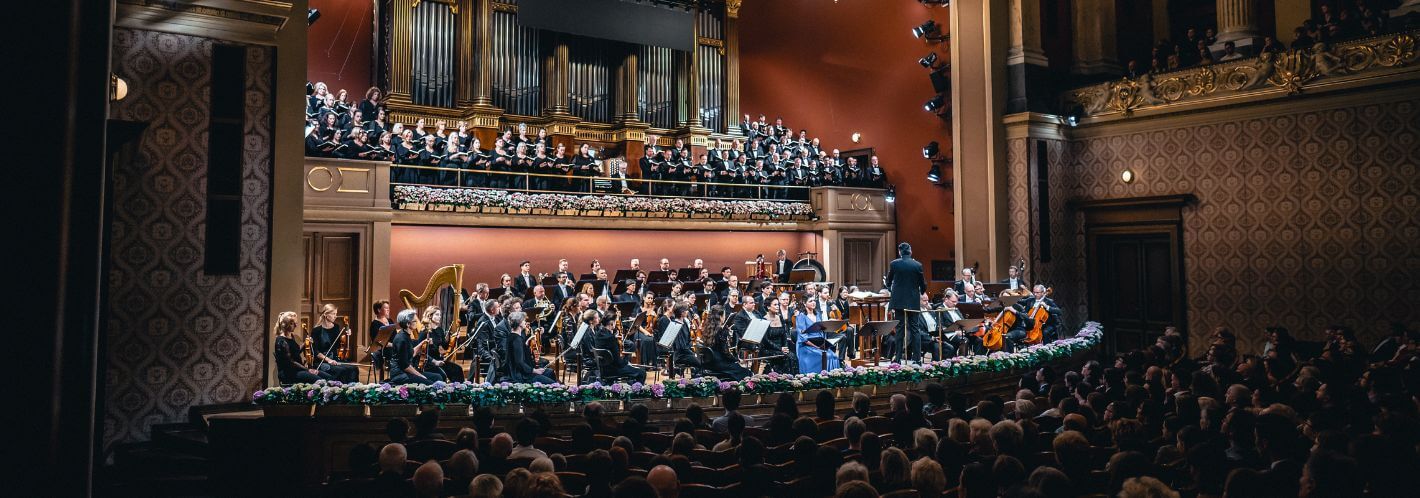
This season marks Lukáš Vasilek’s 18th year as the Principal Conductor and Artistic Director of the Prague Philharmonic Choir (PPC). Whether conducting a cappella repertoire or large-scale cantatas and oratorios with orchestra, Vasilek brings his deep understanding of choral music to every performance. Under his leadership, the PPC regularly collaborates with leading Czech and international orchestras and conductors.
Vasilek has received particular recognition for his outstanding interpretations of the great choral works of Mahler, Dvořák, and Janáček. Notable highlights include Benjamin Britten’s War Requiem, Francis Poulenc’s Stabat Mater, and Arthur Honegger’s Jeanne d’Arc au bûcher. He is also known for his adventurous programming, incorporating jazz and spirituals into the PPC’s repertoire.
Lukáš Vasilek studied conducting at the Academy of Performing Arts in Prague and musicology at Charles University. He occasionally returns to his orchestral conducting roots, working closely with the Prague Philharmonia on their choral concert cycle in collaboration with the PPC, a partnership now in its fourth year. He has also conducted musicians of the Czech Philharmonic and the Kyiv Symphony Orchestra.
Vasilek’s first experience with choral singing came as a member of the Boni Pueri boys’ choir. He later served as choirmaster of the Foerster Chamber Choir and the Prague National Theatre Choir. In 2022, he was a guest conductor for the French ensemble Accentus. In addition to his work with the PPC, he is the founder and conductor of the vocal ensemble Martinů Voices, established in 2010, focusing on chamber choral music from the 19th to 21st centuries. Until recently, he also taught choral conducting at the Academy of Performing Arts.
Lukáš Vasilek’s choral and orchestral work is featured on numerous recordings for Decca Classics and Supraphon. His recent recordings of Bohuslav Martinů’s choral works have earned international acclaim, winning awards from Gramophone, BBC Music Magazine, and Diapason.
source: Pražský filharmonický sbor
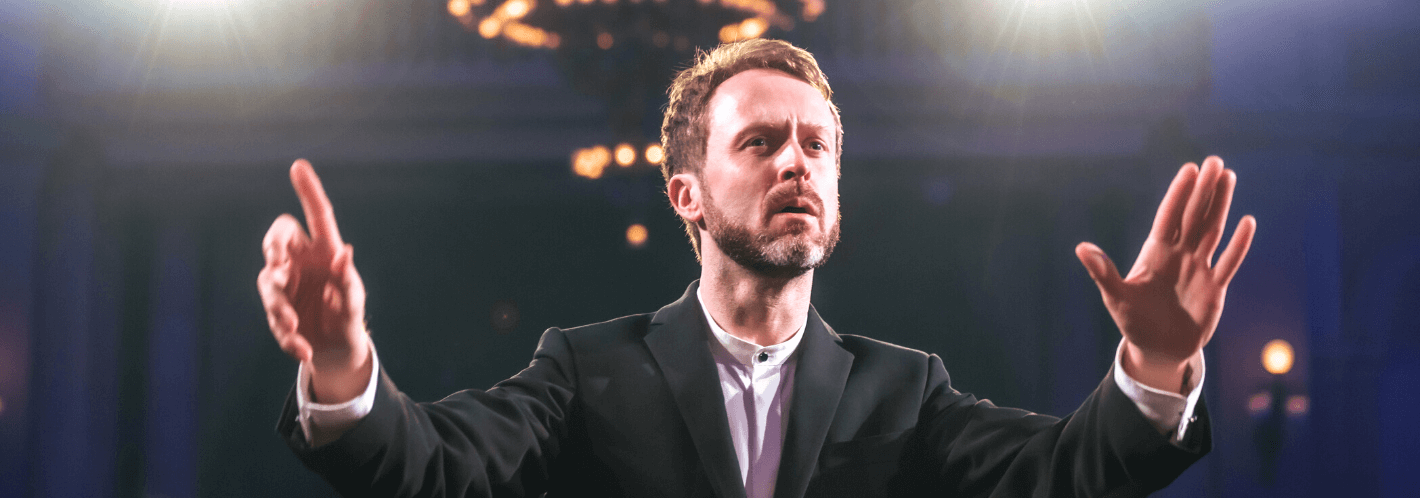
Lithuanian soprano Asmik Grigorian was born in Vilnius and studied at the Lithuanian Music and Theatre Academy. She was a founding member of Vilnius City Opera and has twice been awarded the Golden Stage Cross (the highest award for singers in Lithuania), in 2005 for her debut as Violetta and in 2010 for her performance as Mrs. Lovett Sweeney Todd. Asmik won the Young Female Singer prize at the International Opera Awards in 2016, followed by Female Singer of the Year in 2019. Asmik has made a name for herself on both the concert and operatic platforms since her international career began with a triumphant performance of Madama Butterfly at the Royal Swedish Opera, proving herself as a committed actress and soprano. She then went on to perform Fedora at the same house with established director Christof Loy, with whom she regularly collaborates, followed by Wozzeck at the Concertgebouw Amsterdam with Markus Stenz, which received glowing reviews. In 2017 she made her Salzburg Festival debut in Wozzeck directed by William Kentridge and conducted by Vladimir Jurowski. This was followed in 2018 by her critically acclaimed title role debut as Salome at the Salzburg Festival, in a new production by Romeo Castellucci under the baton of Franz Welser-Möst. Described as “a Salome to end all Salomes” (Financial Times), the role won her the 2019 Austrian Music Theater Award for Best Female Lead. The 2018/19 season saw Asmik’s triumphant house and role debut at Teatro alla Scala as Marietta in Korngold’s Die tote Stadt under Alan Gilbert in a production by Graham Vick, and her role debut as Iolanta at Oper Frankfurt. The 2019/20 season, although cut short, saw Asmik’s return to the role of Manon Lescaut at Oper Frankfurt and at the Bolshoi, and Chrysothemis Elektra at the Salzburg Festival in a production by Krzysztof Warlikowski under Franz Welser-Möst, and in concert performing Shostakovich 14 with the Orchestre de la Suisse Romande under Alexander Shelley, and Beethoven IX under Riccardo Muti at the Salzburg Festival. Asmik returned to the stage in the 2020/21 season as the title role in Christof Loy’s Rusalka at the Teatro Real Madrid under Ivor Bolton. She performed the title role in Madama Butterfly for her debut at the Wiener Staatsoper and made her concert debut at the Opéra de Paris. The summer festival season saw Asmik’s debut at Bayreuth as Senta in Dmitri Tcherniakov’s new production of Die Fliegende Hollander and a return to Salzburg for Elektra, highlighting the special relationship she shares with the festival. An exciting 2021/22 season begins with Asmik’s highly anticipated debut at the Royal Opera House Covent Garden in a new production of Jenufa by Claus Guth. Asmik returns to the Wiener Staatsoper for two productions; as Elisabetta in Don Carlo under Franz Welser-Möst; and as the title role in Manon Lescaut in a Robert Carsen production under Nicola Luisotti. Asmik will then return to La Scala for Queen of Spades under Valery Gergiev, and make her debuts at the Deutsche Staatsoper in Jenufa in a production by Damiano Michieletto, and Festspielhaus Baden-Baden in Queen of Spades under Kirill Petrenko. Asmik works with many of the world's leading conductors including Valery Gergiev, Gianandrea Noseda, Vasily Petrenko, Franz Welser-Möst, Yves Abel, Vladimir Jurowski, Kirill Petrenko, Oksana Lyniv, Markus Stenz, Mikhail Tatarnikov, Alan Gilbert, and Michael Tilson-Thomas. Asmik frequently collaborates with top stage directors including Dmitri Tcherniakov, Romeo Castellucci, Damiano Michieletto, Robert Carsen, Claus Guth, Dalia Ibelhauptaitė, Christof Loy, Barrie Kosky, Alex Ollé, Peter Konwitschny, Robert Wilson, and Vasily Barkhatov to name a few. 2022 will see the release of Asmik’s debut album, a recording of Rachmaninov Songs with pianist Lukas Genusias for Alpha Classics. They will subsequently perform the programme in a series of recitals around Europe in the 2021/22 season, visiting La Scala Milano, Grand Théâtre de Genève, and the Laeiszhalle Hamburg among many others.

Ukrainian tenor Dmytro Popov began his career as a soloist with Kiev National Theatre where he made his professional debut as Lensky Eugene Onegin. He came to international attention in 2013 when he performed the role of Rodolfo La bohème at the Royal Opera House, Covent Garden. From here, Dmytro’s global career took off and he has since performed multiple roles across the world at significant opera houses with highlights including La bohème at the Metropolitan Opera and Bayerische Staatsoper, Alfredo La traviata at Wiener Staatsoper and Mariinsky Theatre, Nicias Thais at Teatro Regio di Torino, Pinkerton Madama Butterfly, Cavaradossi Tosca and Rodolfo Luisa Miller with Deutsche Oper Berlin, Vaudémont Iolanta with Teatro Real Madrid, Macduff Macbeth with Opéra National de Lyon, Andrej Mazeppa with Opéra de Monte-Carlo and Riccardo Un ballo in maschera at Théâtre du Capitôle de Toulouse. As well as being an experienced character performer, Popov is established on the concert platform having performed works including Rachmaninov’s The Bells with the Accademia Nazionale di Santa Cecilia in Rome conducted by Antonio Pappano, with the Berlin Philharmonic conducted by Sir Simon Rattle, with the Gürzenich Orchestra Cologne, and most recently with Orchestre de Paris under Gianandrea Noseda. Additional concert highlights include Verdi’s Requiem at the BBC Proms, Tanglewood Music Festival, with London Philharmonic Orchestra, and in a staged production with Staatsoper Hamburg, A Life for the Tsar at the Festival Radio France, Montpellier and Don José Carmen in concert at the Verbier Festival. A highly successful 2018/19 season saw performances of La traviata at Teatro Regio Torino, Dmitri Tcherniakov’s production of Iolanta with Opéra de Paris, Tosca at the Semperoper Dresden, The Prince in Rusalka at Oper Köln, and Un ballo in Maschera at the Deutsche Oper and Bolshoi Theatre. In concert, Dmytro performed across Europe on a tour of Verdi’s Requiem under Teodor Currentzis, Dvorak’s Stabat Mater with the Boston Symphony Orchestra under Andris Nelsons, and at the Wigmore Hall with pianist Iain Burnisde in a recital of Russian Song. Although cut short, the 2019/20 season saw performances of La Traviata at the Metropolitan Opera, Madama Butterfly at the Opéra de Paris, Carmen at Oper Köln, and Verdi’s Requiem at the Hamburgische Staatsoper. Since returning to the stage in 2021, recent engagements have included Mazeppa at the Bolshoi, Carmen at the Wiener Staatsoper and Rusalka at the Bayerische Staatsoper. Engagements this season and beyond include returns to the Dresden Semperoper for Norma and Tosca, Bayerische Staatsoper for Carmen, Royal Opera House Covent Garden, Bayerische Staatsoper, and Hamburg Staatsoper for La traviata, NDR Hamburg and Oper Koln for Rusalka, among many others. Later, Dmytro returns to the Metropolitan Opera, Wiener Staatsoper, Glyndebourne Festival, and Bayerische Staatsoper. An established recording artist, Dmytro has recently released his debut solo record Hymns of Love with Orchid Classics, recorded with the Deutsches Symphonie-Orchester Berlin. Dmytro also features on Tchaikovsky’s Iolanta with the Gürzenich Orchestra Cologne, released on OEHMS Classics (2015) and Rachmaninov’s The Bells with the Berliner Philharmoniker, conducted by Sir Simon Rattle and released on EMI (2013). Dmytro continues to work with great conductors such as Antonio Pappano, Sir Mark Elder, Andris Nelsons, Andrés Orozco-Estrada, Giampaolo Bisanti, Valery Gergiev, Carlo Rizzi, Thomas Søndergård, Vladimir Jurowski, and Teodor Currentzis, and with many notable directors including Dmitri Tcherniakov, Paul Curran, Peter Sellars, Calixto Beito, Robert Wilson, and many more. Dmytro became the youngest ever opera artist to be granted the title of ‘Honoured Artist of Ukraine’ (2003) which recognises outstanding contribution to performing arts. In 2007, he also became a winner of the prestigious Placido Domingo Operalia Competition.
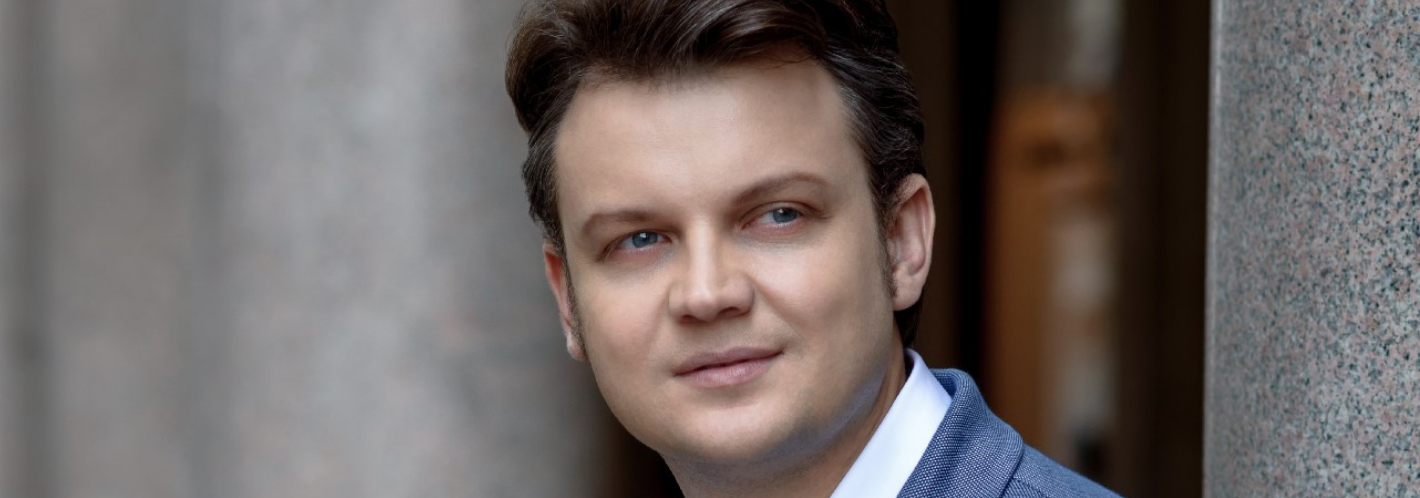
Czech opera singer Jan Martiník (bass) has received several accolades throughout his career, including the prestigious BBC Cardiff Singer of the World Song Prize in 2009.
For nearly a decade, Jan has been a soloist at Staatsoper Unter den Linden in Berlin, the oldest opera house in Germany. Audiences can hear him there in roles such as Stárek/Sacristan (Puccini: Tosca), Dr. Kolenatý (Janáček: The Makropulos Affair), Zuniga (Bizet: Carmen), The Voice of the Oracle (Mozart: Idomeneo), Daland (Wagner: The Flying Dutchman), The Innkeeper (Eötvös: Sleepless), and many others. He also collaborates with Komische Oper Berlin, the National Theatre in Prague, the Vienna Volksoper, and other opera houses.
He regularly performs with leading orchestras worldwide, including the Czech Philharmonic, Bamberger Symphoniker, BBC Symphony Orchestra, London Symphony Orchestra, City of Birmingham Symphony Orchestra, Luzerner Sinfonieorchester, Pittsburgh Symphony Orchestra, Rotterdam Philharmonic, Rundfunk-Sinfonieorchester Berlin, Staatskapelle Dresden, and many more.
He is frequently invited to collaborate with the world’s most distinguished conductors. He has sung under the baton of Daniel Barenboim, Jiří Bělohlávek, Semyon Bychkov, Manfred Honeck, Michael Sanderling, Jakub Hrůša, Fabio Luisi, Zubin Mehta, Sir Simon Rattle, Sir John Eliot Gardiner, and others.
Jan is also active as a recording artist. Among his latest recordings is Schubert’s Winterreise (Supraphon), which was awarded five Diapasons. With the Czech Philharmonic under Jiří Bělohlávek, he recorded Dvořák’s Biblical Songs (2020, Decca). With the London Symphony Orchestra conducted by Sir Simon Rattle, he recorded and performed the dual role of the Priest/Badger in Janáček’s The Cunning Little Vixen—a recording that was nominated for a Grammy in 2020
source: Arte Visio
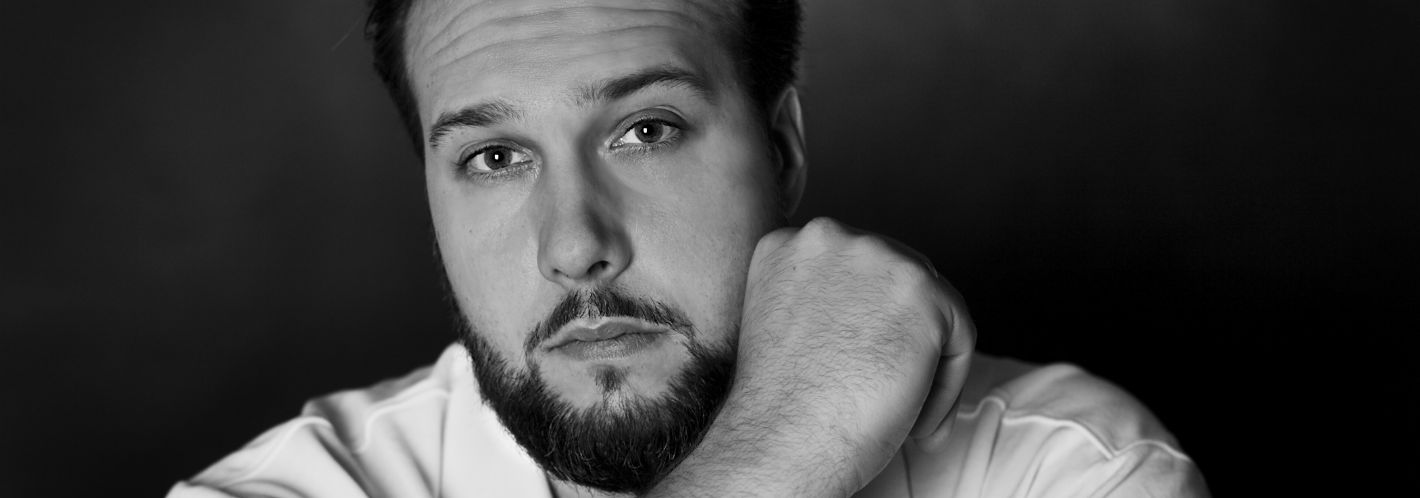
Jamie Barton is a remarkable artist and recognised as such on both sides of the Atlantic. Her many awards include both First and Song Prize at the 2013 BBC Cardiff Singer of the Year Competition, The Richard Tucker Award in 2015 and The Metropolitan Opera’s Beverly Sills Artist Award in 2017 culminating in the invitation to appear as featured soloist in The Last Night of the Proms 2019 - for which she took inclusivity and diversity as her theme - in a performance which was broadcast worldwide on television and on BBC Radio 3 and conducted by Sakari Oramo.
Already a favourite at The Metropolitan Opera, where notable appearances have included Gluck’s Orfeo, Donizetti’s Elisabetta (Maria Stuarda) and Bellini’s Adalgisa (Norma), Jamie Barton has in recent seasons brought many of her key roles to the most prestigious European stages including Azucena (Il trovatore) for her debut at the Bayerische Staastoper under Asher Fisch, Eboli (Don Carlo) at Deutsche Oper, Berlin under Roberto Rizzi-Brignoli; Leonor (La favorite) at Teatro Real, Madrid under Daniel Oren and most recently an incendiary portrayal of Brangäne (Tristan und Isolde) at the Festival d’Aix en Provence in a new production by Simon Stone under Sir Simon Rattle and with the London Symphony Orchestra, broadcast and streamed worldwide on Arte.
In concert Jamie Barton has already collaborated with a number of major conductors including Marin Alsop for both Brahms’ Alto Rhapsody with the Orchestra of the Age of Enlightenment in her BBC Proms debut and Bernstein’s Symphony No.1 Jeremiah for her London Symphony Orchestra debut, and both Sir Andrew Davis and Sir Antonio Pappano for Verdi’s Messa da Requiem with the Orchestra of the Royal Opera House, Covent Garden.
A consummate recitalist, Jamie Barton has appeared at New York’s Carnegie Hall and the Tanglewood Festival. With pianist Kathleen Kelly, she has appeared in Zankel Hall, the Celebrity Series in Boston, Matinée Musicale Cincinnati, and at the Kennedy Center in Washington as part of Renée Fleming’s VOICES series. Last season Ms Barton debuted at Wigmore Hall with a new programme exploring the works of female composers and the portrayal of women by composers of both genders. Jamie Barton’s latest CD release, Unexpected Shadows, is a collaboration with Jake Heggie and was released by Pentatone at the start of the 2020/21 season to unanimous critical acclaim. They return to live performance together this autumn at Oper Frankfurt and the Barbican.

At the age of fourteen she started her music education in church music, composition, organ, orchestra conducting and singing at the Conservatory J. L. Bellu in Banská Bystrica. In 2002 she received a grant for the University for Music and Drama in Graz and made her operatic debut in The magic Flute ('Second Lady') and La Finta Giardiniera ('Ramiro'). In the season 2005/2006 she became a member of the Young Artists Program of the Bayerische Staatsoper in Munich. From 2005 to2009 she had been a part of ensemble of the Theater Heidelberg and interpreted the roles of 'Cherubino' (Le nozze di Figaro), 'Charlotte' (Werther), 'Sesto' (La clemenza di Tito), 'Idamante' (Idomeneo), 'Rosina' (Il barbiere di Siviglia), 'Ramiro' ( Montezuma), 'Megacle' (L'Olimpiade), 'Lucio' (Tito Manlio).
Since the season 2009/2010 she is a member of the ensemble of the Deutsche Oper Berlin, where she sang in Il Barbiere di Siviglia and Le Nozze di Figaro. She furthermore performed as 'Fenena' in Nabucco, 'Hänsel' in Hänsel und Gretel, 'Flora' in La Traviata, 'Zerlina' in Don Giovanni, 'Mélisande' in Pelléas et Mélisande.
In the season 2011/2012 she had a great personal success in the role of 'Cherubino' at the Deutsche Oper in Berlin as well as at the Teatro de la Maestranza in Siviglia under the musical guide of Pedro Halffter, and in Karlsruhe. In the role of 'Idamante' in Idomeneo was she at the National Theater of Prag. 'Suzuki' in Madama Butterfly, 'Maffio Orsini' in Lucrezia Borgia (alongside Edita Gruberová), 'Fenena' in Nabucco, 'Meg Page' in Falstaff, 'Zerlina' in Don Giovanni in Berlin and at the Teatro Petruzzelli in Bari (conductor : Roberto Abbado).2012/13 at the Deutsche Oper Berlin she sung the role of 'Fuchs' in Das Schlaue Füchslein.
In the season 2013/14 she made her successful debut as 'Cherubino'/LE NOZZE DI FIGARO at the Opera in Beijing, and recently her most successful as 'Donna Elvira'/DON GIOVANNI at the Deutsche Oper Berlin and at the Opera Oslo, as well as an outstanding role debut, enthousiastically acclaimed by press and audience, as 'Romeo' in Bellini's I CAPULETI E I MONTECCHI on the occasion of a concert performance of that title within the Klangfestival Dortmund, followed by her equally successful debut at the Semperoper Dresden as 'Rosina'/IL BARBIERE DI SIVIGLIA. In addition to her further performances at the Deutsche Oper Berlin.
In 2014/15 she sang her first 'Elisabetta'/MARIA STUARDA in Ostrava, as well as CARMEN (title role) and 'Donna Elvira' /DON GIOVANNI in Prague and Bratislava. In 2016 came for the first time the role of 'Sesto' /GIULIO CESARE at the Semperoper Dresden and she did her debut 'Marta'/BOITO: MEFISTOFELE at the Festspielhaus Baden- Baden. In 2017 she sang her first 'Dorabella'/COSÌ FAN TUTTE at the Deutsche Oper Berlin and she did her house debut at the New National Theatre in Tokyo as 'Cherubino'/LE NOZZE DI FIGARO. In May she sang the role of the 'Isolier' LE COMTE ORY alongside Lawrence Brownlee and Jessica Pratt at the Musikfestival Klangvokal in Dortmund. In September she sang with Christine Opolais, Richard Samek and René Pape Dvořák's Stabat Mater at the Dvořákova Praha Festival.
By the end of the year she sang the Rosina IL BARBIERE DI SIVIGLIA at the Semperoper Dresden and Bratislava, the role of the Elisabetta MARIA STUARDA in Banská Bystrica. She performs at the Svátky hudby v Praze Festival in the Rudolfinum Hall in Prague, as well as at the Christmas concert in the Reduta concert hall in Bratislava.
In May 2018 she was 'Martha' Boito: MEFISTOFELE alongside Joseph Calleja and Erwin Schrott at the Bayerische Stateopera in Munich and she sang the role of 'Elisabetta' from Donizetti: MARIA STUARDA alongside Diana Damrau and Javier Camarena at the Deutsche Oper Berlin where she also gave her debut as 'Siebel' Gounod: FAUST
In the autumn of 2018 she made her debut as 'Prinz Orlofsky' DIE FLEDERMAUS and in January 2019 she sang the double role of 'Muse/Nicklausse' LES CONTES D'HOFFMANN at the Deutsche Oper Berlin. At the some time she sang the role of Carmen at National Theater Prag and in Slovak National Theater Bratislava.
In April she made her haus debut at the Smetana Hall in Prag, where she sang Dvořák's STABAT MATER Since this season 2019/2020 she is a member of the ensemble of the Staatsoper Hamburg. She sang there roles of the 'Cherubino' LE NOZZE DI FIGARO, of the 'Brigitta' DIE TOTE STADT and of the 'Hänsel' HÄNSEL UND GRETEL. In the some time she sung at theDeutsche Oper Berlin 'Fenena' NABUCCO, 'Prinz Orlofsky' DIE FLEDERMAUS and 'Hänsel' HÄNSEL UND GRETEL.
In February she sung 'Donna Elvira' DON GIOVANNI in Graz Opera and the role of 'Dorabella' COSÌ FAN TUTTE at the Semperoper Dresden. And also the role of 'Engel' in Schumann's DAS PARADIES UND PERI at the Slovak Philharmonie in Bratislava.
She opened the Saison 2020/2021 with the Production MOLTO AGITATO at the Stateopera Hamburg with Kent Nagano and Frank Castorf. In April 2021 In April 2021 she worked at the concert series ARTE CONCERT: EUROPE @ HOME at the side of Daniel Hope, where she presented her country: Slovakia with various songs. In mai she made her role debut as 'Preziosilla' LA FORZA DEL DESTINO at the Deutsche Oper Berlin.

She was born into a musical family in Brno, started out in the Kantiléna choir and subsequently participated in many domestic and international performances (Japan, Great Britain, Austria) as a member of the children’s choir at the National Theatre in Brno. She successfully represented Masaryk University in Brno in a number of singing competitions during her studies at the Faculty of Education there and in 2014 she continued her studies abroad at the State Conservatory in Campobasso, Italy, under the tutelage of Professor Alda Caiello. In the same year, she also took part in the Antonín Dvořák International Singing Competition in Karlovy Vary, where she received two special awards for her performance. She successfully completed her master’s degree in 2018 and now regularly works with a number of orchestras (AKAMUS, L’Armonia Terrena, the Czech Philharmonic, Czech virtuosi, the Brno Philharmonic Orchestra, the Bohuslav Martinů Philharmonic, etc.) and conductors (M. Minkowski, A. Liebreich, J. Kyzlink, Z. Klauda, J. Klecker, R. Kružík and others).
She received her first theatrical experience thanks to the New Operetta Studio in Brno and has been a regular guest performer at the majority of Czech theatres since 2016: the National Theatre in Prague (Pamina, Servilia, Barena), the J. K. Tyl Theatre in Pilsen (Ilia, Ottavia), the National Moravian-Silesian Theatre in Ostrava (Servilia, 1st Nymph) and the Silesian Theatre in Opava (Countess Almaviva). She also participates at a large number of festivals every year (Smetana’s Litomyšl, the Znojmo Music Festival, the Janáček May International Music Festival, “Zlatá Pecka”, Concentus Moraviae, and so on).
In this year’s season, she will once again perform the role of Mařenka in a production of the Bartered Bride at the National Theatre, Donna Elvira in a production of Don Giovanni at the Silesian Theatre in Opava and also in the summer theatrical production of Handel’s Messiah at the Revolving Theatre in Český Krumlov. This is her sixth year as a permanent member of the Czech Ensemble Baroque under the leadership of Roman Válek, which is involved in authentic performances of early music. She regularly participates in courses and competitions, for example a masterclass with the baroque icon Emma Kirkby or courses led by Kateřina & Adam Plachetka. In August 2018, she also became a laureate at the prestigious Cesti singing competition in Innsbruck. She was included in the wider nomination for the 2020 Thalia Award for her rendition of the role of the Countess in a production of The Marriage of Figaro at the Silesian Theatre in Opava.

The mezzo-soprano Markéta Cukrová is a unique phenomenon on the Czech vocal music scene. She is a sought after performer of music from the Middle Ages to the 20th century due to her exceptional versatility and sense of musical style. Her long-term success in stylistic performance has seen her cooperate with many renowned ensembles and orchestras (La Risonanza, Mala Punica, Les Muffatti, Collegium Marianum, Collegium Vocale Gent, Collegium 1704, {OH} Orkiestra Historyczna, the Czech Philharmonic, the Prague Symphony Orchestra and the Antwerp Symphony Orchestra), with which she has contributed to more than twenty recordings.
Her recordings of 8 Italian arias by J. D. Zelenka with the Ensemble Tourbillon and J. J. Ryba’s Stabat Mater with the L’Armonia Terrena orchestra, which received the Diapason D’Or Award in 2017, have garnered significant interest from Europe’s expert public. A CD of Antonín Dvořák’s Moravian Duets accompanied by the composer’s own piano (Šaturová, Spurný) was released in 2018. Markéta’s other activities include the dramaturgy for the successful Baroko 2015 showcase in the West Bohemian Region as part of the Pilsen 2015 European Capital of Culture project.
She is also involved in teaching in the form of courses and lessons focussing on singing technique and the interpretation of vocal music. She has translated a book of discussions on singing technique and vocal teaching by the famous teacher Margreet Honig, which has been released under the title Skutečný zpěv (Real Singing).
In addition to her extensive concert activities, Markéta also dedicates herself to theatre work. She received rave reviews for her performance of the role of Dardanus in Handel’s opera Amadigi di Gaula at the Händel-Festspiele in Göttingen, Germany and was invited by the festival to perform a solo recital. This was followed by guest performances at the National Theatres in Košice (Handel/Alcina), Brno (Martinů/The Plays of Mary, Purcell/Dido et Aeneas, Saariaho/ L'Amour de loin, Rossini/ Le comte Ory, Offenbach/The Tales of Hoffmann, Ivanovič/Monument), Prague (Monteverdi/L’Orfeo, Handel/Rinaldo, Martinů/Julietta) and Ostrava (Britten/The Rape of Lucretia, Gluck/ Iphigénie en Aulide, Martinů/Julietta). In recent years, she has been included in the short nomination for the Thalia Award for the role of the Pilgrim in a production of L'Amour de loin, the Jantar Award for artists of the Moravian-Silesian Region for the role of Bianca in a production of The Rape of Lucretia and the Classic Prague Award for a concert performance.
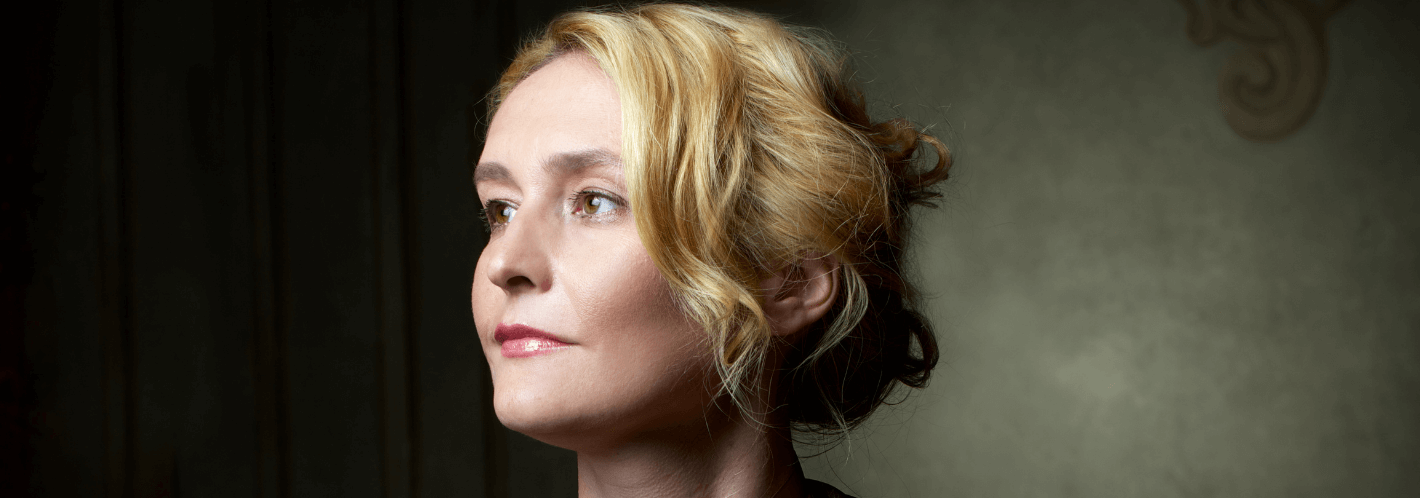
Monika Jägerová is one of the hopes of the youngest singing generation. She debuted on the Czech opera stage in 2017 in the role of Mrs. Quickly (Falstaff) at the Silesian Theater in Opava, where she then introduced herself as Kohout (Cunning Little Vixen) and Háta (The Bartered Bride). In the 2018/2019 season, she made her debut at the Moravian-Silesian National Theater in Ostrava in the roles of Princess (Suor Angelica), and Zita (Gianni Schicchi). In 2021 she performed as the 3rd Wood Nymph in Dvořák‘s Rusalka at Bergen Nasjonale Opera, Norway. At the Teatro Verdi in Trieste, Italy, in the role of Mrs. Baggot she participated in the international performance of Britten's opera The Little Sweep (2016) and performed the alto part in the stage oratorio Stabat Mater by Valentina Shuklina (2017). In season 2021/2022 she will perform as Bradamante in National Theater Brno (G. F. Händel: Alcina) and as Barbara/Sofia Petrovna (H. Krása: Verlobung im Traum, NDM).
She is passionately dedicated to the interpretation of early music, regularly collaborating with ensembles such as Collegium 1704, Czech Ensemble Baroque, Hof-Musici, and Ensemble Damian; in 2019 she was a guest at the Oude Muziek festival in Utrecht with the Tourbillon Ensemble. She regularly performes at the Castle Baroque Theatre in Český Krumlov. Among all she performed here as Timante (J. A. Hasse: Demofoonte, 2019) for which role she gained wider nomination for prestigeous Thalie Prize 2019. At the Olomouc Baroque Festival she performed as Gloria (Vivaldi: La Gloria e Imeneo, 2018) and Giove (Karl Ditters von Dittersdorf: Il Tribunale di Giove, 2019). For the summer season in Vadstena, Sweden, she assumed the role of Ascalax (G. Ph. Telemann: Orfeo, 2019).
Monika Jägerová studied singing with Pavla Zumrová, and interpretation of early music with Irena Troupová. She has attended master classes with Emmy Kirkby (Dartington International Summer School 2015), Chantal Santon Jeffery, and Deda Cristina Colonna (Academy Versailles 2018), Markéta Cukrová and Lorenzo Charoy (Summer School of Early Music Valtice 2015).
In 2016 she won the Prague Singer International Singing Competition, in 2017 she received an honorable mention at the Iuventus Canti International Singing Competition (Vráble, Slovakia) and made it to the finals of the Renata Tebaldi International Singing Competition in San Marino. In 2019 she won 3rd prize in the Lieder category at the Antonín Dvořák International Singing Competition in Karlovy Vary. She also studied violin at the Jan Deyl Conservatory in Prague, and musicology at the Faculty of Arts of Charles University.
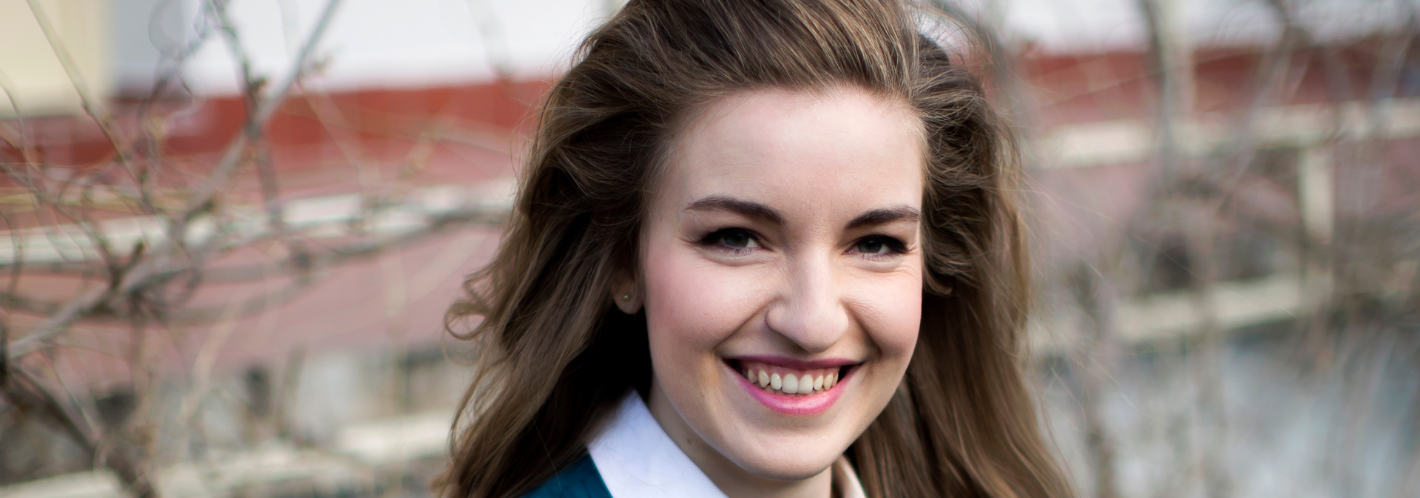
The Czech mezzo-soprano Štěpánka Pučálková has been a soloist and member of the Semperoper ensemble in Dresden since the 2018/2019 season.
She was born in Berlin and studied under Professors Elisabeth Wilk, E. Gramss and J. Wallnig at the Universität Mozarteum Salzburg, graduating in 2012. At the same time, she also received the Lilli Lehman Medal from the Stiftung Mozarteum organisation.
She will debut as Adalgisa in Norma, Hänsel in Hänsel und Gretel or as Hagar in the world premiere of the opera Die andere Frau during the 2021/2022 season at the Semperoper.
This year, she performed at the opening gala concert of the international music festival in Český Krumlov as a guest of Plácido Domingo.
She has performed at significant festivals and theatres such as Mozartwoche Salzburg, Salzburger Festspiele, Osterfestspiele Salzburg, the Beijing Music festival and others.
She debuted in the role of Siegrune in Die Walküre under the baton of Christian Thielemann, accompanied by the Staatskapelle Dresden and directed by Vera Nemirova at the 50th anniversary of the Osterfestspiele in Salzburg. This production was also performed in Beijing in 2017 as a coproduction with the Beijing Music Festival. She was a finalist in the Hans Gabor Belvedere Singing Competition in 2015 and also received the prize for the “Best Female Voice” at the Concours International de Belcanto Vincenzo Bellini in Marseille.
At the beginning of 2019, she performed under the baton of the maestro Plácido Domingo at a “Mozart’s birthday” concert at the Estates Theatre in Prague. In 2018, she debuted at the National Theatre in the role of Charlotte in the opera Werther, for which she received the Director of the National Theatre Award for Artists under 35 and was also nominated for a Thalia Award.
She has performed many of the principal mezzo-soprano roles at the Semperoper in Dresden, such as Page Urbain in Meyerbeer’s Les Huguenots, Sesto in Giulio Cesare, Cherubino in The Marriage of Figaro, the Muse/Nicklausse in The Tales of Hoffmann, Rosina in The Barber of Seville and Olga in Eugene Onegin. In January 2020, she debuted at the Wiener Volksoper in the role of Carmen.

The bass-baritone Boris Prýgl is one of the current crop of talented young singers. Since the 2019/20 season, he has been a soloist at the Bavarian State Opera in Munich, where his repertoire includes the roles of Moralès (Carmen), Ping (Turandot), Prince Ottokar (Der Freischütz), the Hunter (Rusalka) etc.
He has several victories in singing competitions to his name, including the title of the absolute winner of the 2015 Antonín Dvořák International Singing Competition in Karlovy Vary, from which he also walked away with a large number of special prizes, including the Prague National Theatre Opera Prize and the Prague Spring International Music Festival’s Prize. His international successes include 2nd place at the Ferruccio Tagliavini Competition in Austria. In July 2017, he reached the finals of two of the most prestigious international singing competitions: Belvedere and Plácido Domingo’s Operalia. In September 2019, he received the Vienna State Opera Director Dominique Meyer Award at the Stella Maris International Vocal Competition.
Boris Prýgl graduated from Peter Mikuláš’ class at the Academy of Performing Arts in Bratislava and he received his first on-stage experience at the Slovak National Theatre in Bratislava as Leporello (Don Giovanni), Don Basilio (The Barber of Seville), Don Fernando (Fidelio), Pietro (Simon Boccanegra), Brander (the Damnation of Faust) and in the title role of Paisiello’s opera King Theodore in Venice. In May 2017, he performed a recital at the Prague Spring International Music Festival and took on the role of the Tutor in the Czech premiere of Rossini’s opera Le comte Ory at the National Theatre in Brno. He was a member of the Bavarian State Opera’s operatic studio in Munich in 2017–2019.

At the Prague Conservatory, he pursued his studies in singing under the guidance of Jiří Kotouč. From 2008 onwards, he furthered his education at HAMU in Prague, studying under Roman Janál. He won the Junior category of the International Antonín Dvořák Singing Competition held in Karlovy Vary.
Since 2004, he has been performing as a guest at the Prague State Opera in Dvořák’s Rusalka and Puccini’s Turandot, and since the 2010/2011 season, also in Verdi’s Rigoletto and Bizet’s Carmen. At the F. X. Šalda Theatre in Liberec, he has played Silvio in Leoncavallo’s Pagliacci and Morales in Bizet’s Carmen. His portrayal of Silvio earned him a great acclaim and a nomination for the 2009 Thalia Award.
In the summers of 2011 and 2012, he reprised the same role alongside José Cura as Canio for IMF Český Krumlov. In the 2011/2012 season, he was cast at the Prague State Opera, and since 2012, he has been a soloist at the National Theatre Opera and the State Opera. There, he has performed roles such as Rodrigo in Verdi’s Don Carlo, Figaro in Rossini’s The Barber of Seville, Dandini in Rossini’s La Cenerentola, Don Giovanni in the opera Don Giovanni and Count Almaviva in Mozart’s The Marriage of Figaro, the title role in Weinberger’s opera Schwanda the Bagpiper, Marcello in Puccini’s La Bohème, Silvio in Leoncavallo’s Pagliacci, Papageno in Mozart’s The Magic Flute, Ping in Puccini’s Turandot, Adolfo in Dvořák’s The Jacobin, Mercutio in Gounod’s Romeo and Juliet, the Maestro in Donizetti’s Viva la Mamma, Harašta in Janáček’s The Cunning Little Vixen, Čekunov in Janáček’s opera From the House of the Dead, Henry Cuff in Britten’s Gloriana, Albert in Massenet’s Werther, and many others.
Jiří was nominated for the Thalia Award in 2013 for his performance as Rodrigo in Verdi’s Don Carlos. He is a regular guest at the J. K. Tyl Theatre in Pilsen, where he has performed the title role in Tchaikovsky’s Eugene Onegin, Frank in Puccini’s Edgar, Silvio in Leoncavallo’s Pagliacci, and Pseudolus in Martinů’s The Soldier and the Dancer. He is a frequent guest at the National Theatre in Brno (Rodrigo in Verdi’s opera Don Carlos, the title role in Eugene Onegin, Gilgamesh in Martinů’s The Epic of Gilgamesh, Valentin in Gounod’s Faust, Marcello in La bohème, Ping in Puccini’s Turandot, Aeneas in Purcell’s Dido, and Aeneas and Moralès in Bizet’s Carmen), as well as on other Czech stages. In August 2018, he received the Director of the National Theatre Award for Artists under 35.
He has collaborated with various leading conductors including Petr Altrichter, Semyon Bychkov, Oliver Dohnányi, Plácido Domingo, Iván Fischer, John Fiore, Jakub Hrůša, Robert Jindra, Dirk Kaftan, Jaroslav Kyzlink, Libor Pešek, Lukáš Vasilek, and many others.
He cooperates with the Bulgarian National Opera in Sofia, the Prague Spring and Dvořák Prague festivals, the Budapest Festival Orchestra, the Czech Philharmonic, the FOK, SOČR, PKF Prague Philharmonia, the Brno Philharmonic, the Bohuslav Martinů Philharmonic, the Prague Philharmonic Choir, and the Czech Philharmonic Choir Brno.
In the past season, he performed the title roles in Bedřich Smetana’s operas, such as Přemysl in Libuše, Vok in The Devil’s Wall, and Tomeš in The Kiss.
In March 2024, he performed in the opera Rusalka (the roles of Hunter and Gamekeeper) at Opera de Tenerife on the largest of the Canary Islands.
In the 2024/2025 season, he is looking forward to new productions of the operas Manon Lescaut (G. Puccini) at the National Theatre Brno, Faust (Ch. Gounod) at the National Theatre in Prague, and a recording of a CD entitled Epilogue (J. Suk) with the Czech Philharmonic under the direction of conductor Jakub Hrůša.
source: Jiří Brückler

The Rudolfinum is one of the most important Neo-Renaissance edifices in the Czech Republic. In its conception as a multi-purpose cultural centre it was quite unique in Europe at the time of its construction. Based on a joint design by two outstanding Czech architects, Josef Zítek and Josef Schultz, a magnificent building was erected serving for concerts, as a gallery, and as a museum. The grand opening on 7 February 1885 was attended by Crown Prince Rudolph of Austria, in whose honour the structure was named. In 1896 the very first concert of the Czech Philharmonic Orchestra took place in the Rudolfinum's main concert hall, under the baton of the composer Antonín Dvořák whose name was later bestowed on the hall.
